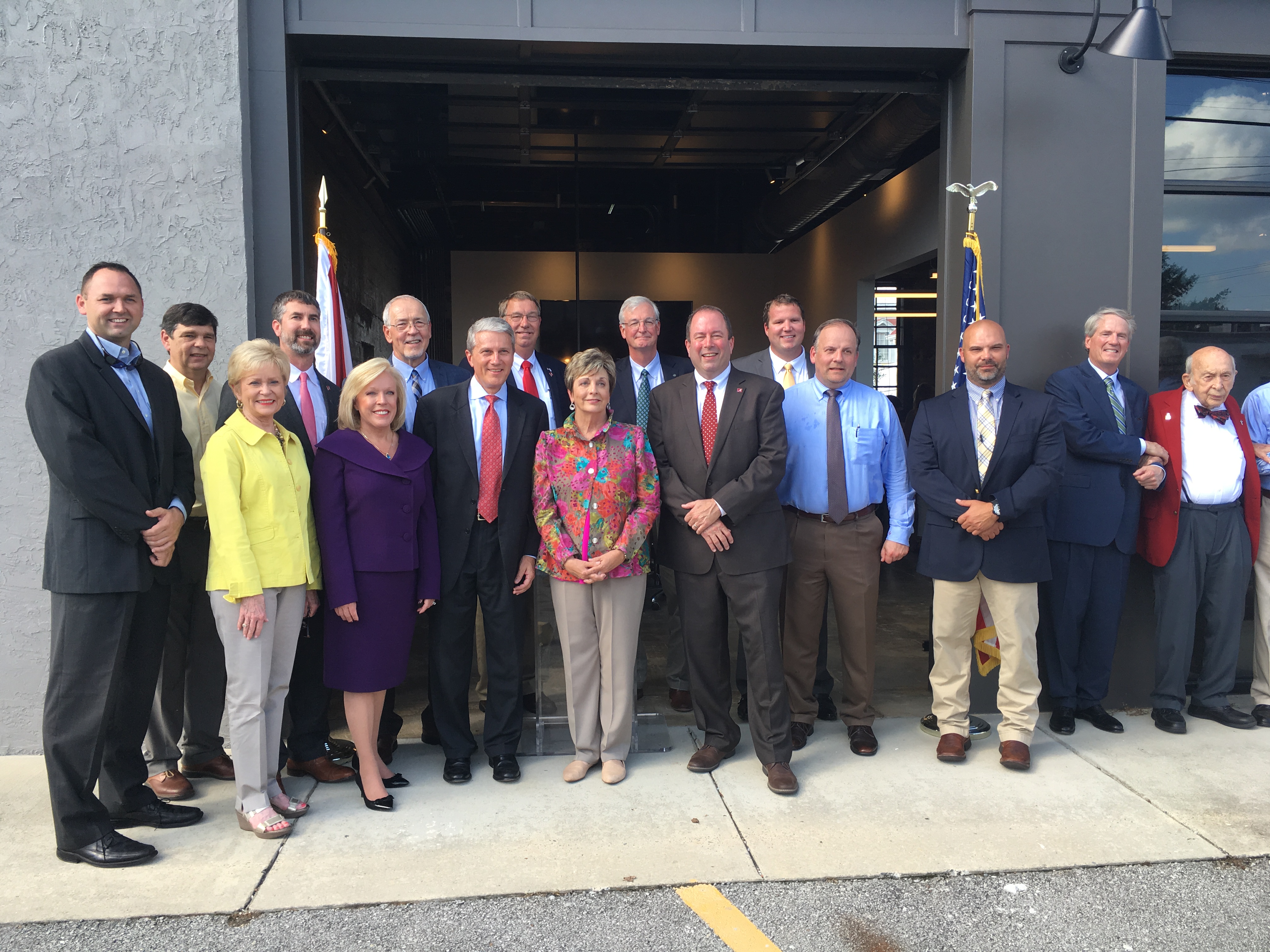Community leaders pose for a photograph in front of the Technology Village after Wednesday’s announcement./ W.C. Mann
CULLMAN – Cullman is serious about fostering new business, and others in the state are taking notice…and action. On Wednesday afternoon, representatives of the City of Cullman and several other entities gathered behind the Cullman Economic Development Agency’s (CEDA) headquarters downtown to announce the creation of a new Technology Village to help stimulate local business growth.
Leaders from the City, Cullman Area Chamber of Commerce and Wallace State Community College (WSCC) have entered into a partnership with the University of Alabama (UA) to create a program in Cullman that will assist entrepreneurs in creating new business ventures in the area. Cullman is one of the first communities in the state to be chosen by UA for the Technology Village program.
The City of Cullman will have primary responsibility and authority of Cullman’s Technology Village, with WSCC and the Cullman Chamber sharing equal roles under the City’s leadership. UA will serve primarily in a consulting role, with its faculty providing a think tank to advise area entrepreneurs.
Former CEDA Director and current Cullman Area Chamber of Commerce Strategic Plan Coordinator Peggy Smith led Wednesday’s announcement event. Mayor Woody Jacobs, WSCC President Dr. Vicki Karolewics, Chamber of Commerce President Leah Bolin, and CEDA Director Dale Greer were joined by Rick Swatlowski, director of the University of Alabama’s Office for Technology Transfer, UA Vice President for Research and Economic Development Dr. Carl Pinkert, and Economic Development Partnership of Alabama Executive Vice President Steve Sewell to share the news. In attendance were members of the Cullman City Council, Cullman County Commission, city and county school boards, and other agencies.
UA President Stuart Bell, who was not able to attend, said in a statement, “I’m excited about the University’s strategic partnerships with Cullman and Fairhope. One of our primary goals as Alabama’s flagship university is to increase activities that drive economic development for our state. As we reach out to emerging tech businesses in these areas, we look forward to helping small businesses thrive and bolster their local economies.”
“The City, the Chamber and the college were all being successful individually in supporting business and industry,” Greer said. “The partnership allows us to pool our resources to help people with ideas bring their company or product vision to reality. This exciting partnership will open doors for entrepreneurship opportunities.”
Shared Bolin, “Creating a culture of entrepreneurship that focuses on startups and technology-based jobs is one of the Chamber’s five major focuses. We are delighted to partner with the City of Cullman and Wallace State Community College.”
“Collaboration is a critical tool for success in all communities,” agreed Karolewics, “and never anywhere more apparent in our region than here where the City of Cullman, Chamber of Commerce, Wallace State Community College and the University of Alabama have collaborated to create a unique entrepreneurial center in our Technology Village. Tech startups need minimal square footage but quite unique kinds of physical spaces to bring their innovative ideas to market. The potential technology development applications to agriculture, industry, small business and industrial mechanization are super exciting!”
The idea for such a center came from a visit made by Jacobs, Karolewics and Bolin to similar projects overseen by Clemson University in South Carolina. In the communities of Rock Hill and Bluffton, the trio viewed programs that in two years fostered 12 to 14 company start-ups each, and created approximately 70 new jobs with a payroll of $2.8 million.
The program envisioned by Cullman area leaders has been described as a business incubator type of program, but will actually serve as more of a resource center for local business start-ups. The office will not offer funding to entrepreneurs, but will have the potential to connect those people with outside funding sources, as well as corporate partnerships and other resources.
One of the strengths of such a program is its potential to create businesses that will stay close to home, creating jobs and contributing to the local economy.
“Everybody says they’re amazed to find how much intellect there is within their communities that’s going somewhere else,” said Greer. “Both of the ones that we visited said, ‘We didn’t keep everything; because, depending on what it is, their primary resource or sponsor might be somewhere else. But for the most part, you get them in your community, and they stay, and they build in your community.’”
“The program will help Cullman retain young professionals by diversifying jobs and sparking growth in burgeoning tech fields,” said Smith. “It is exciting to be one of the first communities selected by the University of Alabama for the program. I am excited about the opportunity this partnership affords our citizens to showcase their great business ideas.”
Swatlowski said, “I’m convinced every community has entrepreneurs. The communities that can leverage and support them will move forward and grow their tax base. When you create jobs with minimal investment, that is an outstanding return.”
No formal timetable has been established on the official opening of the Technology Village or hiring of the director. However, community leaders are focused on moving forward as quickly as possible. The City of Cullman plans to appoint both a director and board to oversee operations of the center, which will be located in a renovated space at the east end of CEDA’s headquarters building at 200 First Ave. NE.
Copyright 2017 Humble Roots, LLC. All Rights Reserved.




















